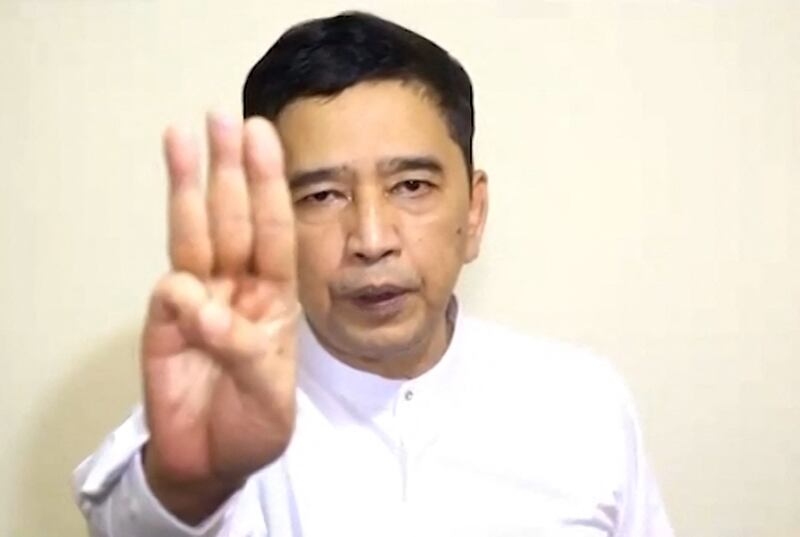On Oct. 27, the Northern or “Three Brotherhood” Alliance, consisting of the Myanmar National Democratic Alliance Army, the Arakan Army and the Ta’ang National Liberation Army, launched “Operation 1027” – named for the date of the offensive. Two weeks since the operation began, the alliance has made notable gains against the military in several key cities in Shan state in the country’s northeast.
On Nov. 6, after four days of clashes with the military, the anti-junta People’s Defense Force, or PDF, which are paramilitaries under the shadow National Unity Government, or NUG, and ethnic Kachin Independence Army soldiers occupied the district-level city of Kawlin in Sagaing region. The region has seen some of the fiercest fighting between junta troops and the armed resistance in Myanmar since the military seized power from the elected government in a Feb. 1, 2021 coup d’etat.
Min Ko Naing, a former leader of the pro-democracy 88 Generation Students Group, is a member of the NUG’s advisory council on the PDF. He has been a vocal critic of the military regime, calling it “bloodthirsty” for its killing of thousands of peaceful protesters and other civilians. In an exclusive interview with RFA Burmese reporter Khin Maung Soe, Min Ko Naing discusses the recent success of the armed resistance in Shan and Sagaing, and how it might be replicated in other parts of the country.
This interview has been edited for length and clarity.
RFA: To what extent has the capture of Kawlin city by the NUG’s forces and its allies bolstered Myanmar's Spring Revolution?
Min Ko Naing: The story has reached its climax. We all talked about how we would struggle harmoniously and collaboratively. We have done what we have promised. The revolution has enjoyed support both internally and externally, from the people. The present fruitful results are what came from these collaborative efforts. Our forces have conquered a district level city … If we continue with this momentum, we could capture other towns and cities like a tidal wave.
RFA: What is your view on ‘Operation 1027’ in northern Shan state?
Min Ko Naing: The operation was launched at the right time, when the fascist military had let down its guard ... The junta has suffered great losses they never experienced in our lifetime. They lost more than a hundred of their outposts in different towns within a matter of days. The resistance forces are now defeating the military’s forces one after another. It is the worst situation for the military in its history.

The people have been through hell. But their victory in northern Shan state will spread to the whole country. The military has begun to disintegrate due to low morale because they realize that they can be defeated. Even senior officials have started to ignore orders. The military has suffered losses in battle and their spirit is being broken like the spread of disease.
RFA: What are the reasons behind these significant successes? Are they the result of unity amongst the revolutionary forces, the decline of the junta, or anything else?
Min Ko Naing: All these things are factors that led to these significant successes … Moreover, we have consistently hurt the junta for many days … without a break … Even a giant tree will eventually collapse under its own weight when more than half of its trunk has been cut.
The military has instilled fear in the minds of its subordinated forces. They have always brutally cracked down on people taking part in protests and the revolution. However, the people have responded through engaging in armed struggle against the military ... The military has violated codes of conduct, rules and principles with impunity, misused its power and become mired in corruption. This organization will surely collapse. The people are determined to remove it.
‘We must not lose sight of our goals’
RFA: How will the military respond to the ongoing situation? What type of political role will the military play in the future?
Min Ko Naing: The military brutally cracked down on the people. They arrested innocent people and prominent persons. They were held as captives and endured brutal treatment. As the military is in a difficult situation, they will use these detainees as leverage in negotiation. The military will try to build bridges with the international community. At the same time, they will try to undermine the unity of the resistance forces. We must not lose sight of our revolutionary goals and need to respond to the military as one.
RFA: Could you talk briefly about the status of the Spring Revolution? Is it closer to the “federal democratic union” the people hope for?
MKN: The [junta] soldiers have lost their fighting spirit. That means they will defect to the way of truth and righteousness. It will be the right decision for them … The military will attempt to prevent [armed resistance] offensives from the north of the country. They will try to disintegrate our forces ... But they can’t do anything to stop it.
This is the time to end the darkness for our people. We have seen the dawn. The sun is setting on the fascist military regime. Until then, the people must continue fighting to the best of their ability.
Translated by Aung Naing. Edited by Joshua Lipes and Malcolm Foster.
